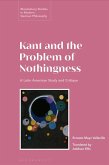Alexander Baumgarten's Ethica Philosophica (1740) served as a chief textbook of philosophical instruction in German universities for several decades, and was used by Immanuel Kant for his lectures on moral philosophy between 1759 and 1794. Now translated into English for the first time, John Hymers explores the extent of Baumgarten's influence on the development of German philosophy. Accompanied by an introduction to Baumgarten and his work, this translation features an explanation of the main themes of the Ethica Philosophica, touching upon its relation to Christian Wolff and G.F. Meier's practical philosophy, but focusing especially on its role in Kant's lectures. First-time translations of elucidatory passages from the writings of Meier, Wolff, and Heinrich Köhler appear together with the relevant transcriptions of Kant's lectures on ethics. Based on a thorough knowledge of the original text, Hymers' clear translation and supporting material makes it possible to distinguish Kant's own remarks and insights from his attempts to expound and summarize Baumgarten's ideas. This is a much-needed contribution for anyone working in the history of modern philosophy.
Bitte wählen Sie Ihr Anliegen aus.
Rechnungen
Retourenschein anfordern
Bestellstatus
Storno








